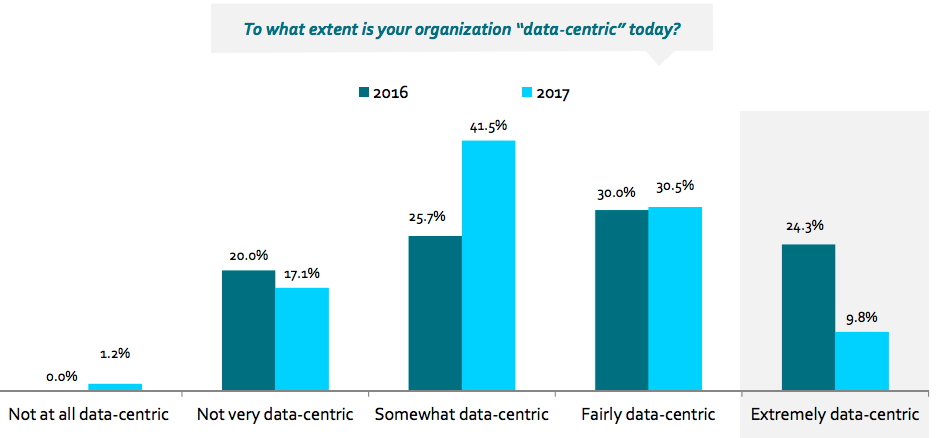
U.S. companies remain focused on tapping into data across media and
ecommerce platforms, but cannot seem to overcome the obstacles and hurdles to achieve success, according to a report released Tuesday from the IAB Leadership Summit in Palm Desert, California.
The Data-Centric Organization 2018 report from the Interactive Advertising Bureau (IAB), its Data Center of Excellence, and the Data
& Marketing Association (DMA) explores the ways that U.S. companies continue to evolve their business processes and organizational structure to better leverage data for advertising and
marketing.
Compiled by Winterberry Group, the findings are based on an online survey of 113 advertisers, marketers, publishers, technology developers and marketing service providers in North
America, and reveal an industry-wide talent gap -- particularly with respect to data analytics skills, management, and processing -- as the most significant obstacle associated with achieving "data
centricity."
advertisement
advertisement
The updated study from 2016 to 2017 shows marketers are less likely to describe their organization as "extremely data-centric," said Neil O'Keefe, senior vice president of
marketing and content at the DMA.
"Each year marketers realize they fall further behind the rapidly increasing volume and velocity of available data," he said. "The ability to fully
leverage data requires a collaboration between marketers and their business partners who can provide an expanded level of expertise and insights."
Only 9.8% of survey respondents describe
their organization as "extremely" data-driven, and more than 44% said they expect to reach that level by 2019 with one caveat. The same data users are becoming less confident that their efforts are
paying off. Just 40.3% describe their organization as being "fairly data centric" -- down from 54.3% who described their organization this way in the previous year.
Although marketers are optimistic about continuing to build data-centric organizations, Orchid Richardson, vice president and managing
director or the IAB Data Center of Excellence, was surprised by the percentage drop of those defining themselves as "fairly data-centric."
"In my opinion, it’s a realization that
building a data-centric organization is complex and requires the right systems, processes and people," Richardson said.
Just 1.3% of panelists said they are "extremely confident"
their respective organizations have the right expertise, skills and experience needed to gain value from data, down from 5.2% in 2016. More than 87% of panelists said that data analytics is the
competency their organization needs most to advance their use of data.
Data users also increasingly credit their supply-chain partners
with supporting their efforts to gain value from the use of data and optimize their use of marketing technology. The survey results also reveal a growing interest in seeing partners provide training
for internal function functional managers and an increasing demand for case studies and best practices from within the industry and outside sectors.